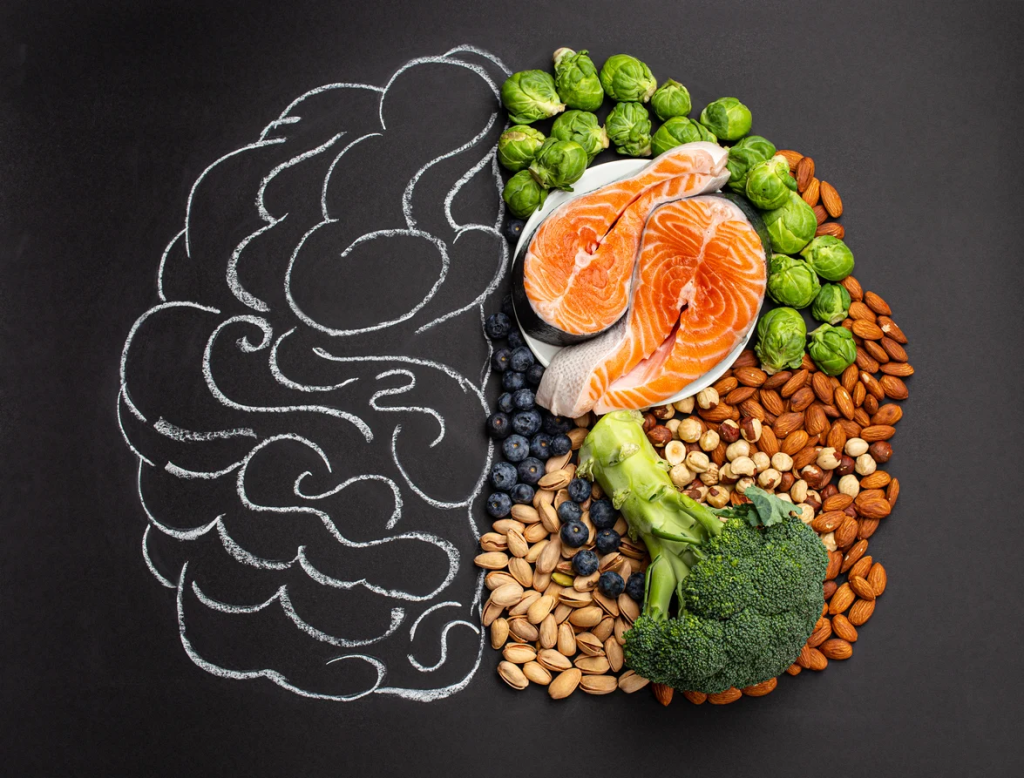Introduction to Food and Mental Health

[Source: blog.massgeneralbrighamhealthplan.org]
Your brain and stomach share a deeper connection than you might imagine. The food choices you make daily don’t just affect your physical health – they play a crucial role in shaping your mental well-being. What’s fascinating is that your gut actually serves as a secondary command center for your emotional responses. In fact, most of your body’s serotonin – the happiness hormone – is produced in your digestive system, and any inflammation can disrupt this production process [#1].
How Food Affects Your Moods
Think of your brain as a high-performance machine that needs premium fuel to function at its best. The nutrients from your meals act as building blocks for brain chemicals that control your sleep, mood, and energy levels. Poor food choices can trigger inflammation, mess with your gut bacteria, and create a ripple effect that impacts your mental state.
Correlation Between Diet and Mental Health
The relationship between what you eat and how you feel isn’t just about immediate energy boosts or sugar crashes. Long-term dietary patterns can influence your mental health significantly. While some people have found success with intuitive eating approaches, others notice dramatic mood improvements by eliminating certain foods from their diet.
Understanding this connection helps explain why your food choices matter more than just counting calories or maintaining weight. Your dietary decisions influence everything from your stress levels to your ability to concentrate and even your emotional resilience throughout the day.
Foods with Negative Effects on Mental Health

[Source: yourmentalhealthpal.com]
While many foods boost your mood and mental clarity, others can significantly impact your psychological well-being in less favorable ways. Research continues to reveal surprising connections between certain foods and mental health challenges.
Sugary and Caffeinated Beverages
Your favorite sodas and energy drinks might be sabotaging your mental health more than you realize. Studies show that sugar-sweetened drinks have a direct correlation with depression [#2]. Energy drinks pose an additional risk – their high caffeine content can trigger irregular heart rhythms and amplify anxiety symptoms .
Processed and Refined Foods
Those convenient packaged snacks and ready-meals might save time, but they could cost you your mental wellness. A diet heavy in processed foods shows strong links to increased anxiety and depression . These foods often cause rapid blood sugar fluctuations, leading to mood swings and irritability [#3].
Hidden Culprits
Several seemingly innocent foods can affect your mental state. Artificial sweeteners in diet sodas may increase stress hormones like cortisol . Even items like frosting contain trans fats that studies have connected to depression .
Alcohol and Its Effects
While alcohol might temporarily lift spirits, its long-term impact on mental health can be severe. As a depressant, it often leads to hangxiety – that uncomfortable mix of hangover and anxiety that follows a night of drinking .
Gluten Sensitivity
For some individuals, gluten sensitivity extends beyond digestive issues to affect mental health. Research indicates that gluten can trigger anxiety or depression in sensitive people . This connection highlights why paying attention to how different foods affect your mood matters.
Conclusion
Understanding Food’s Impact on Mental Health
The relationship between food and mental health runs deeper than most people realize. What we eat doesn’t just fuel our bodies – it shapes our thoughts, emotions, and psychological well-being in profound ways.
Key Takeaways for Better Mental Health
Making informed dietary choices becomes crucial for maintaining psychological balance. Here are the essential points to remember:
- Limit or avoid sugary beverages and energy drinks that can trigger mood swings and anxiety
- Reduce consumption of processed foods linked to depression and mental fog
- Watch out for hidden ingredients like artificial sweeteners that might affect stress levels
- Monitor your response to gluten, especially if you notice mood changes after consuming it
- Be mindful of alcohol intake, as it can worsen anxiety and depression long-term
Moving Forward with Mindful Eating
Your food choices today shape your mental health tomorrow. By understanding how different foods affect your brain chemistry and mood, you can make better decisions about what goes on your plate. Similar to how certain habits slow down metabolism, poor food choices can dampen your mental clarity and emotional stability.
Remember that mental health nutrition isn’t about perfection – it’s about progress. Small changes in your diet can lead to significant improvements in your psychological well-being. Just as hormones influence weight management, the foods we eat influence our mental state through complex biochemical processes.
Take control of your mental wellness by treating food as more than just fuel – view it as a tool for maintaining both physical and psychological health. Start with small, manageable changes, and pay attention to how different foods affect your mood and energy levels.